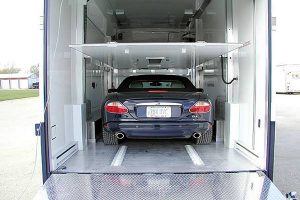Introduction: Shipping A Car To Hawaii
Transporting a car to Hawaii can be an exciting prospect for many individuals, whether they are relocating to the islands or simply want to enjoy the freedom of having their own vehicle in this beautiful tropical paradise. However, before embarking on this endeavor, it is crucial to understand the regulations and requirements involved in shipping a car to Hawaii, particularly if the vehicle does not meet U.S. standards.
One common concern that arises when considering shipping a car that does not meet U.S. standards is whether it will be permitted entry into Hawaii. The United States has established certain safety and emissions standards that all vehicles must adhere to in order to be legally operated on its roads. These standards aim to ensure public safety and protect the environment.
While there are strict regulations in place regarding vehicle imports into the United States, including its territories like Hawaii, there may still be options available for shipping cars that do not meet these requirements. Various factors such as the age of the vehicle, modifications made, and potential exemptions can influence whether or not a car can be shipped to Hawaii.
This article aims to provide valuable information about shipping a car to Hawaii when it does not meet U.S. standards. By understanding these regulations and exploring possible solutions, individuals can make informed decisions regarding their plans for transporting their vehicles across the Pacific Ocean safely and legally.
Overview Of U.S. Standards For Vehicle Imports
When considering shipping a car to Hawaii, it is crucial to understand the U.S. standards that govern vehicle imports. The United States has established specific regulations and requirements that imported vehicles must meet to ensure safety, environmental compliance, and consumer protection. The primary governing body overseeing these standards is the National Highway Traffic Safety Administration (NHTSA), which sets safety regulations for vehicles imported into the country.
These regulations include crashworthiness standards, occupant protection systems, and various other safety aspects that aim to protect drivers, passengers, and pedestrians. In addition to NHTSA requirements, the Environmental Protection Agency (EPA) establishes emission standards for imported vehicles. These standards aim to reduce pollution and promote cleaner air quality by ensuring that vehicles comply with specific emission limits. To import a car into the United States successfully, it must meet both NHTSA safety standards and EPA emission standards.
If a vehicle fails to meet these requirements, it may be subject to modifications or alterations before being allowed entry or sale within the country. It is worth noting that certain exemptions exist for vintage or classic cars that were manufactured before modern safety or emission regulations were implemented. However, even in these cases, there are still specific criteria that must be met to qualify for exemption.
Understanding The Federal Clean Air Act Requirements
When shipping a car to Hawaii, it is essential to familiarize yourself with the Federal Clean Air Act requirements. The Clean Air Act, enacted by the United States Environmental Protection Agency (EPA), sets standards and regulations for air quality and emissions control across the country.
Under this act, vehicles imported into the United States, including Hawaii, must meet certain emissions standards to protect public health and the environment. These standards aim to minimize harmful pollutants released into the atmosphere from vehicle exhausts.
If your car does not meet U.S. emissions standards, you may encounter difficulties when shipping it to Hawaii. The EPA requires all vehicles brought into the country to comply with specific emission limits based on their model year and type.
To ensure compliance with these requirements, it is advisable to have your vehicle undergo an emissions test before shipping it. This test will determine whether your car meets U.S. emission standards or if modifications are necessary for compliance.
Keep in mind that failure to comply with these regulations may lead to penalties or even denial of entry for your vehicle at Hawaiian ports. Thus, understanding and adhering to the Federal Clean Air Act requirements is crucial when considering shipping a car that doesn’t meet U.S. emission standards to Hawaii.
Exceptions And Exemptions For Vehicle Imports To Hawaii
Importing a vehicle to Hawaii that doesn’t meet U.S. standards can be a complex process. However, there are certain exceptions and exemptions that can allow you to ship a car to Hawaii even if it doesn’t meet these standards. One exception is for vehicles that are over 25 years old. Such vehicles are considered antiques or classics and may be eligible for importation as collector’s items.
These vehicles are exempted from meeting the stringent U.S. safety and emission standards. Additionally, some military personnel may qualify for exemptions when shipping their cars to Hawaii. Military members who are on permanent change of station (PCS) orders or deploying to Hawaii may be allowed to import their vehicles without having to comply with all the U.S. standards. Moreover, temporary visitors or non-residents planning on staying in Hawaii for a limited period might also be eligible for exemptions when importing their cars.
This exemption is typically granted under the condition that the vehicle will be exported back out of the state within a specified timeframe. It’s important to note that while these exceptions and exemptions exist, they still require proper documentation, permits, and compliance with certain regulations specific to each case.
Applying For A Certificate Of Exemption From The Epa
If you are considering shipping a car to Hawaii that does not meet the U.S. standards, it is crucial to understand the requirements and regulations set by the Environmental Protection Agency (EPA). In certain cases, you may be eligible to apply for a Certificate of Exemption from the EPA, allowing you to import your vehicle without meeting the standard emissions and safety guidelines.
To begin this process, you must first determine if your vehicle qualifies for an exemption. The EPA provides specific criteria under which vehicles may be exempted, such as being over 21 years old or being used solely for competitive racing purposes. Once you have confirmed eligibility, you can proceed with applying for the certificate. To initiate your application, visit the EPA’s official website or contact their designated office responsible for exemptions.
You will need to provide detailed information about your vehicle, including its make, model, year of manufacture, and VIN number. Additionally, supporting documentation such as photographs and relevant historical records may be required. It is important to note that receiving a Certificate of Exemption does not guarantee entry into Hawaii without meeting any other state-specific requirements. Therefore, it is advisable to consult with local authorities in Hawaii regarding any additional permits or inspections that might be necessary before importing your car.
Safety Standards And Regulations For Shipping A Car To Hawaii
When planning to ship a car to Hawaii, it is crucial to be aware of the safety standards and regulations set by the United States. These requirements ensure that vehicles imported into Hawaii meet certain criteria to guarantee the safety of both drivers and passengers. Firstly, all cars shipped to Hawaii must comply with U.S. Federal Motor Vehicle Safety Standards (FMVSS).
These standards cover various aspects of vehicle safety, including crashworthiness, occupant protection, lighting, braking systems, tires, and more. It is essential that your car meets these FMVSS requirements before shipping it to Hawaii. Additionally, vehicles must pass an inspection conducted by the U.S. Department of Transportation’s National Highway Traffic Safety Administration (NHTSA). This inspection ensures that the car meets federal safety regulations and has not been modified in a way that compromises its safety features.
Furthermore, cars shipped to Hawaii must adhere to emission standards set by the U.S. Environmental Protection Agency (EPA). The EPA regulates vehicle emissions in order to reduce air pollution and protect public health. Therefore, it is crucial for your vehicle to meet these emission standards before being shipped.
The Process Of Shipping A Non-Compliant Vehicle To Hawaii
Shipping a non-compliant vehicle to Hawaii involves several steps and requirements that must be fulfilled before the car can be transported. While it is possible to ship a car that doesn’t meet U.S. standards, there are certain conditions that need to be met. Firstly, it is crucial to establish the exact reasons why the vehicle doesn’t comply with U.S. standards. Common issues include emission levels, safety features, or modifications made to the vehicle.
Once identified, you will need to research and find a reputable shipping company that specializes in transporting non-compliant vehicles. Next, you must obtain an exemption from the U.S. Department of Transportation (DOT) and the Environmental Protection Agency (EPA). This requires submitting detailed documentation explaining why your vehicle should be allowed entry into Hawaii despite not meeting U.S. standards. Once you have received approval from both agencies, you will need to make arrangements with a shipping company for transportation.
It is advisable to choose a company experienced in handling non-compliant vehicles as they will have knowledge of specific procedures and requirements. Prior to shipping, your vehicle may need modifications or alterations in order to meet certain safety regulations in Hawaii. These modifications can range from installing additional safety features or adjusting emission levels depending on the nature of non-compliance.
Costs And Considerations When Importing A Non-Standard Car To Hawaii
Importing a non-standard car to Hawaii can be an enticing option for those seeking unique vehicles not readily available on the island. However, it is essential to understand the costs and considerations involved before making such a decision. Firstly, importing a non-standard car may incur additional expenses. These costs include shipping fees, import taxes, customs duties, and registration fees. Depending on the vehicle’s specifications, modifications might be necessary to meet safety and emissions standards in Hawaii.
These modifications can be costly and time-consuming. Moreover, it is crucial to consider the availability of parts and maintenance services for non-standard vehicles in Hawaii. Since these cars are not commonly found on the island, finding replacement parts or skilled mechanics may pose challenges. This scarcity could lead to increased repair costs and longer waiting times for repairs. Additionally, insurance coverage for non-standard cars might differ from standard vehicles due to their unique characteristics or modifications.
It is advisable to research insurance options thoroughly before importing such a vehicle. Lastly, one must also consider potential resale value when importing a non-standard car. As these vehicles deviate from typical market preferences in Hawaii, finding potential buyers willing to pay a fair price might prove difficult.
Conclusion: Navigating The Rules For Importing Vehicles Into Hawaii
Importing a vehicle into Hawaii that does not meet U.S. standards can be a complex process. It requires careful navigation of the rules and regulations set by both federal and state authorities. While it may seem daunting, it is not impossible to ship a car to Hawaii if it doesn’t meet U.S. standards. To begin with, individuals looking to import non-compliant vehicles should consult the Environmental Protection Agency (EPA) and the Department of Transportation (DOT) for specific guidelines on emissions and safety requirements.
These agencies can provide valuable information on whether modifications can be made to bring the vehicle up to standard or if exemptions are available for certain types of vehicles. Additionally, understanding the unique regulations imposed by Hawaii is crucial. The state has its own set of rules governing vehicle imports, which may differ from those set at the federal level. Familiarizing oneself with these regulations will help ensure compliance and avoid any potential setbacks during the importation process.
Working with a reputable shipping company experienced in handling vehicle imports to Hawaii is highly recommended. These companies have expertise in navigating customs procedures, documentation requirements, and can provide guidance throughout the process. In conclusion, while importing a car into Hawaii that doesn’t meet U.S. standards presents challenges, it is feasible with proper research and adherence to applicable regulations.








